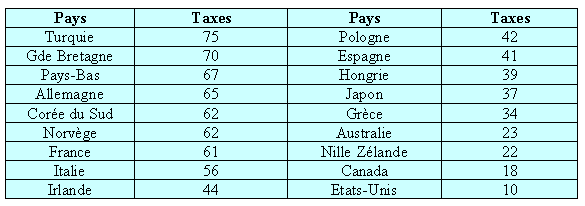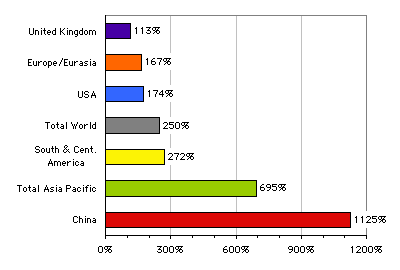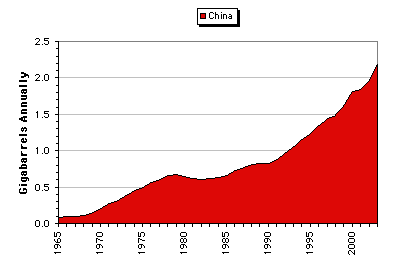Energy and Economic Growth: A BRIEF SUMMARY! by Remi Guillet. 3rd and last part: taxes on energy.
Read 2ere part.
The fuel taxes
Traditionally, the fuel business constitutes a boon for governments, which find in it a significant budgetary revenue and a strategic lever allowing them to support or on the contrary to further constrain a particular activity ...
The fuel taxes in the world (% of the cost at the pump)

Sort descending (Source OECD / 2006)
Learn more about taxation and margin petroleum fuels in France.
Exceptions!
But meanwhile we are still in the Chicago Convention which after the Second World War and to develop air transport banned kerosene tax (provision to meditate when you know the consumption of aircraft per kg moved: 10 times the train!)
Other sectors of activity are also affected by tax refunds, cyclical, partial etc. This is for example the case of fishing, agriculture, taxis….
Tax refunds are also used to launch the development of a particular production line of petroleum substitutes: vegetable oil, ethanol, etc.
We are currently seeing that the end of these various tax and tax exemptions can be dangerous for the survival of an energy supply chain (example of German diester and bioethanol)
The challenge of the "carbon" tax
The carbon tax (or CO2 tax) is, in its concept, and with other "ecotaxes", a tax intended to cover the costs incurred by the pollution of CO2 and, at the same time, to promote options for energy. renewable alternatives.
Thus, the decision to implement the carbon tax is now becoming a global issue insofar as it can have an impact on the evolution of the greenhouse effect, of which we see that all the consequences, based on on top of each other, causing climate change which is accelerating (far exceeding the most pessimistic forecasts made less than 10 years ago!).
For land transport, it will be understood that the carbon tax could be "collected" at the various customs passages and thus serve as a regulator for international trade, so ultimately, could have a double impact: direct, ecological - its primary reason for be- but also social, with its indirect repercussions on relocations and other transport of goods ...
Readers interested in the Carbon tax will read this discussion.
Growth and energy: the dynamic aspect
The evaluation of the “remaining” years of consumption seen in the part 1ere was made on the basis of 2005 consumption. But we can no longer ignore the emergence of new economic powers (China, India, Brazil, etc.), with double-digit growth over the past ten years as regards China (even if today the economic situation affects this country like the others, its inclinations are intact!).
a) Increase in oil consumption in different regions and between 1965 2003 (source: BP).

Oil consumption in different regions and between 1965 2003 (source: BP).
b) Evolution of China's oil consumption.

China's oil consumption since 40 years (source: BP).
It has increased in 11 38 years!
Conclusion; and now… what are we going to do?
Of course, wanting to do better, to register our individual and collective approach in the direction of what we believe to be our “well-being” will continue: it is a challenge specific to intelligence, to human nature!
But no longer based our strategic choices on the existence of the manna of fossil fuels graciously offered by Mother Nature has become an environmental imperative ... which forces us, as of today, to move towards another development model (We can consult the 'article by Rémi Guillet “Plea for another growth” on the site of the Harmattan editions).
Probably constrained by circumstances more than by deliberate choice we will have to produce more and more the energy that we will need to meet our challenges or more precisely we will have to invest, build, operate infrastructures having to produce a deemed “clean” energy. This in place of a pre-existing energy, offered for a long time and in abundance.
But this “conversion” will not be free in the economic sense: a new “charge” will appear in the balance sheet of our activities ... capital wealth reduced by as much ...
In all probability, this conversion will be all the less easy to accept as it will generate growth that is assessed as (very?) Moderate compared to what was observed at the end of the last century.
In doing so, new questions about the real interest of globalized exchanges about everything (for example about yoghurt which travels 9000 kms before arriving on our plate!) Will appear!
However, this conversion will have its sunny side: given what will become of transport costs, much less relocation will be to be feared, the virtues of proximity between production and consumption will be enhanced! "Manufacturer" a large part of the energy that we will need should (normally) constitute a new and welcome source of jobs!
In the end, the question which seems to us today to be the most relevant concerns the modalities of the "passage" from the current model to the next model. The latter must integrate scarcity where there was abundance, therefore much more economical, in water and energy, having to generate and respond to radically new challenges.
Cutting off the water for the duration of toothbrushing, extinguishing all the fires when we sleep will not be enough: if it's better than nothing, we fear that these "small gestures" will give us good. consciousness and in this way put him to sleep!
Political speeches urge us to join the business of "sustainable development". But it is a business like any other insofar as we add the same challenge of profitability, profitability, with the same difficulties to succeed ... in a context of globalization, relocation, inequity (what to think solar panels made in China and installed in Provence?).
More generally, the official speeches on “climate change” remain rather reassuring (can they be other?) We would have another 15 years to react, they say! But it has already been said at least 10 years: it's like the horizon that advances as we walk!
So, do we have to wait another 15 years to consider any major change!
No ! We must tackle the problem head on… and everywhere, starting today! So find a formulation or a framework for the economic issues so that the world fits “naturally” into the “post-oil era”. To be more explicit, we are going to change our own formulation to declare that we must now replace the “traditional economic challenge” by a “societal challenge”, thus indicating our desire to move towards a more humanistic, more equitable development model. , aiming at a better sharing in space and in time, within the same generation, with the following generations, demonstrating our desire to respect the natural heritage.
This, let us say it again, now! So we can only turn to political leaders who must intervene with great determination, and together, to "change course" urgently. The current crisis can help them!
If we react quickly, we will have avoided the worst environmental chaos, we will have had the wisdom to keep some of this fossil fuel manna for the generations to follow ... And it will be good for them, because we must know that for certain uses, fossil fuels and more particularly oil will have virtually no economically viable substitutes for a very long time to come!
So, after the question asked by G. Bécaud (the title of this last development), we can meditate on various interpretations of G. Brassens' text when he was singing ...
"Let's die for ideas, okay, but slow death ... Okay, slow death!" "
Since our subject wanted to be a “brief synthesis”, then we will retain from this text - longer than initially thought! - that with fossil fuels we had the best, but wanting to play too much with fire… we prepared for the worst! It's up to us to play differently, now and urgently, to show our ability to better control the rest of our saga with energy.
- Learn more and discuss the forums: energy and GDP Synthesis

